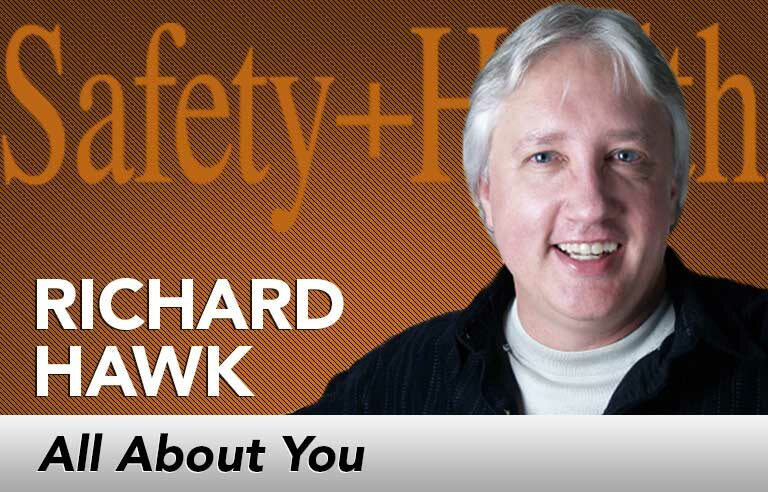All About You: The benefits of breaks

EDITOR’S NOTE: Motivating employees to work safely is part of the safety professional’s job. But who motivates the motivator? In this monthly column, veteran safety pro and professional speaker Richard Hawk offers his entertaining brand of wisdom to inspire safety pros to perform at their best.
“Take a break.” When was the last time someone told you that? Taking a break has become passé in our modern “go, go, go, be as efficient as you can and stay connected or else” business world. But in any of your endeavors, going at something steady for a long time without a break is counterproductive. Don’t just take my word for it – this subject has been studied intensively by many research groups, including the U.S. Army Institute, the University of Amsterdam and the University of Illinois at Urbana-Champaign. The studies conclude that you should “take breaks if you want to perform at your best.”
Taking a break from a project can help you in two ways. One, when you get back to working on the project again, you’re more likely to have fresh ideas because your brain has had some time to contemplate the project without new data coming in. Your subconscious is a phenomenal problem solver and idea generator. But you need to give it some time to work its magic. A break, especially one that includes a few nights’ sleep, can do that. Two, taking a break from a project can help make a project less tedious, giving you renewed energy and inspiration about the work.
Here are a few more “break tips”:
Don’t wait until you’re burned out: Just like the benefits of drinking water before you’re thirsty, taking a break before you’ve exhausted your mental energy is a wise move. You’ll also enjoy the break more.
Plan your breaks: When I’m working on the computer, I set a timer and take a break every hour. It’s usually a short one. I have a guitar in my office, so often I’ll play a song or two, then get back to business. Now, you may not be able to play a guitar at work, but there are many other things you could do, even if it’s just going to a window and looking outside for a bit.
If you’re participating in a group activity – for example, you’re chairing a safety committee that will last longer than an hour – give your team a break. When the group gets back, have them do a fun activity – one that takes only a few minutes. It’s a stimulating way to restart your meeting and get everyone’s mental juices flowing.
Disconnect if you can: The thought of this may be frightening, but disconnecting from the “electronic feed” of email, text messages, and computers and other electronic devices can make a break even more relaxing and rejuvenating. We may complain about having too many messages, yet we’ll still check them when we don’t have to. I know I do it at times.
Results from research at the University of Derby showed that 1 in 8 people are addicted to their smartphone. And when some people aren’t connected to their phone – or if they even think about the prospect – they suffer from what some psychologists are calling “iPhone separation anxiety.” I purposely turn my phone off, or put it where I can’t hear it, at least twice a day – especially when I take a break. (I must admit, I quickly check for messages once it’s back in my hands!)
Go somewhere else: Even if you don’t stop working, changing your environment can give you some relief. I often leave my office and take my laptop to a social club I belong to. Both the short ride to the club and the change of scenery gives me a boost in energy. If you can, go to your lobby or break room for a bit.
Remember that when you take a break, you’re improving your performance. I got the inspiration for this article from watching a show about how Olympic athletes train. The training experts on the show were discussing how breaks (in the form of rest, change of routine and naps) are vital to an athlete’s success. No matter what you do, if you stay at it too long without any relief, your abilities will suffer. Think of it as sharpening your mental ax.
So, now that you’ve finished reading this article – take a break!
Richard Hawk helps companies around the world create more vibrant safety cultures by showing them how to make safety fun. As a professional speaker, author and musician, he also inspires employees to focus better and enlightens safety leaders about ways to increase their influence. To learn more about Richard, visit www.makesafetyfun.com.
Subscribe to the podcast feed in iTunes
Post a comment to this article
Safety+Health welcomes comments that promote respectful dialogue. Please stay on topic. Comments that contain personal attacks, profanity or abusive language – or those aggressively promoting products or services – will be removed. We reserve the right to determine which comments violate our comment policy. (Anonymous comments are welcome; merely skip the “name” field in the comment box. An email address is required but will not be included with your comment.)

